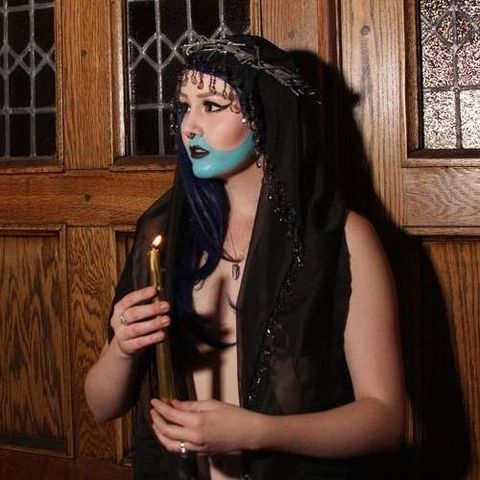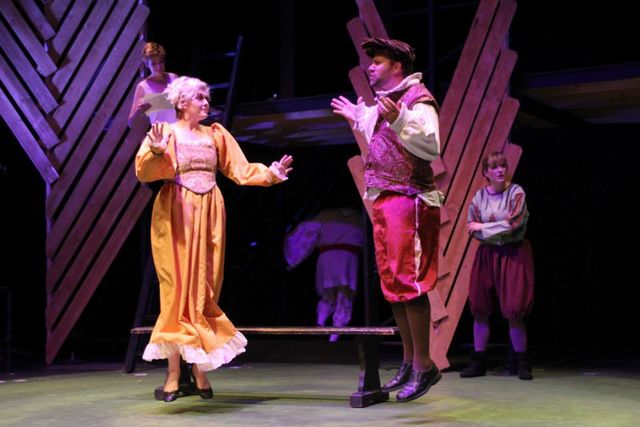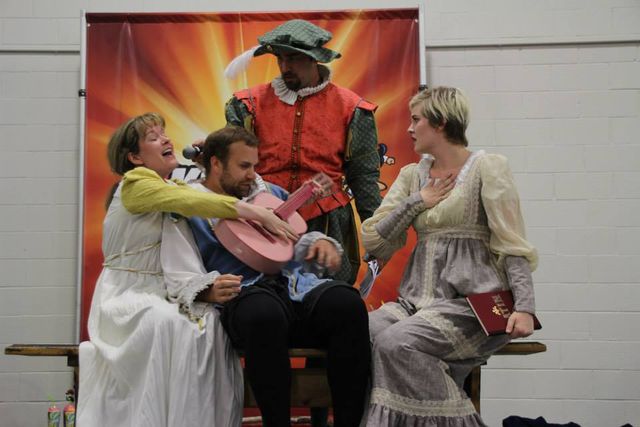How often do you stop and analyze the thousands upon thousands of words you use each day? Do you often think about how language is evolving or how your use of words can deny other people access to conversations?
For most, answers are likely never, probably not or no. For something that is so ever-present in our daily lives, the words we speak are often background noise, something we use without thinking. But for Alex Vermillion, a senior in English, questions about how language works and changes over time are part of zir daily life.
Working on two projects for the Honors College and Department of Theatre, Vermillion is looking to deconstruct notions of how language “should work” and provide access to those who may feel shut out of traditional forms of literature such as poetry and Shakespeare.

Vermillion’s Honors Thesis started around four years ago. Vermillion said it took zir a while to land on a topic, but eventually zir interest in gender and poetic writings began to merge after years of research and theory.
“It was actually Kathryn Stockton [a professor in the Department of English] who really prodded me and taught me everything basic-wise of gender theory. I was like, oh my god, I’m trans, like, this makes so much sense,” Vermillion said. “Being a nonbinary transperson is kind of interesting because it’s newer, not that many people know about it and even within the trans community it’s kind of rejected. That’s why I kind of wanted to study it. Because I was like, if I’m going to talk about who I am and what I am and what I do, I need to know what the hell I’m talking about.”
Zir project turned into a creative piece resembling a mash-up of a dictionary and poetry collection analyzing the ways in which language constructs the world and people’s identities.
One of the thesis’ pieces is “In Between,” a poem where Vermillion is a child in the middle of an argument between zir parents and realizing ze doesn’t identify with male or female. The title is the defined word, with a pronunciation key next to it that forces the reader to say it differently than the way it is “normally” said. The work itself is divided into numbers, as if the text itself is a set of definitions.
“It’s mainly about what it’s like to be a nonbinary person and a writer,” Vermillion said. “It’s really difficult to talk about yourself when you don’t have access to the language — because it doesn’t exist. Some of them are kind of random. One of them is called Siren and it’s just me at a waterfall and one of them is just about my sister and the color of her hair. Just random snippets of my life that lead to who I am.”
Zir other project is working with Martine Kei Green-Rogers and Tim Slover, theatre professors at the U, to adapt Shakespeare’s plays into modern language, a project for the Oregon Shakespeare Festival. Vermillion says this translation will hopefully make the Bard’s work accessible for everyone who wants to enjoy it and to increase the numbers of those people.
While this project has its critics who say it is “dumbing down” some of the most influential works in English literature — similar No Fear Shakespeare, a commonly used collection of modern translations of the plays — Vermillion said their project isn’t so straightforward.

Keeping the rhyme, rhythm, stanzas, sonnets and as much of the original language as possible, Vermillion and the playwrights ze works with are simply changing some of the Renaissance language. For instance, “ye” and “thou” become “you,” and the writers will replace words English no longer uses to new terms, while maintaining the integrity of the story.
“What’s interesting about this play project is that a lot of people are pissed about it, especially those prestigious people who want to cling to the old text and the old language,” Vermillion said. “My argument is a lot of Shakespeare’s texts are adaptations of other plays that were adaptations that were adaptations. Stories that are great just keep getting retold and that’s the purpose of this [project] is to retell it in modern times.”
For instance, Vermillion is adapting “Two Noble Kinsmen,” which is an adaptation of the Middle English story written by the poet Geoffrey Chaucer, who got it from the medieval Italian writer Boccaccio, who took it from the tale of the siege of the Grecian city Thebes.
Vermillion said in the same way none of these adaptations replaced the other, critics can realize this project is looking to be a companion to Shakespeare. But primarily, ze hopes it provides access to the plays that wasn’t there before.
“So many people just expect that people should understand Shakespeare, and it’s like okay, what about people who don’t have access to a higher education?” Vermillion said. “What about people who don’t have access to a theater or don’t have access to the English language, what are they supposed to do in that case? Language is meant to play around with and change and I think it’s naive to say that we should stick to our old ways when it comes to language. Everything is evolving, even gender. We need to start making room for other genders, making room for more language.”

Vermillion said while zir current Shakespeare project isn’t specifically focusing on aspects of the plays that could be considered queer, ze hopes in grad school to combine nonbinary language with the Bard’s works to see how ze can play with gender in these old texts.
“If you think about Shakespeare in his time, everyone was dressing up in whatever gender they wanted — and by everybody I mean men — they were dressing up as other genders, nobody cared, it was all part of the fun,” Vermillion said. “I feel like a lot of gender presentation is theatre, in general. I mean, what are we doing every single morning? Painting our faces, putting on certain shoes, shopping for specific kinds of bodies?”
While Vermillion said zir identity as a nonbinary trans person influences zir perception of Shakespeare, ze does not go to performances to see zirself represented. For instance, while Vermillion reads characters such as Puck from “A Midsummer Night’s Dream” as very androgynous, zir perception of gender fluidity comes from actual performances of Shakespeare rather than the texts. For instance, ze said, the U performed a version of this play a few years ago where all of the fairies’ genders were changed.
This gender fluidity Vermillion finds in Shakespeare enters into other aspects of zir life as well. In addition to spending 35 hours each week researching language, Vermillion is also a drag performer with the Bad Kids Collective, a community of queer artists. Vermillion has two characters, one of whom is “Lady Lilith,” which can also be pronounced “Laddie Lilith.”
“That’s really helped my idea of what gender is and what it’s not,” Vermillion said. “Before it seemed so black and white, but then you start researching and studying and you start performing it on stage and you realize that gender is not black and white, it’s a performance. Drag is just an over-personified version of what we do every day, especially as queer people. It’s a fun and beautiful thing.”
Vermillion said in five years ze hopes to have zir MFA in theatre studies or dramaturgy, the study of drama, and open a queer performing company in Seattle.
@Ehmannky


